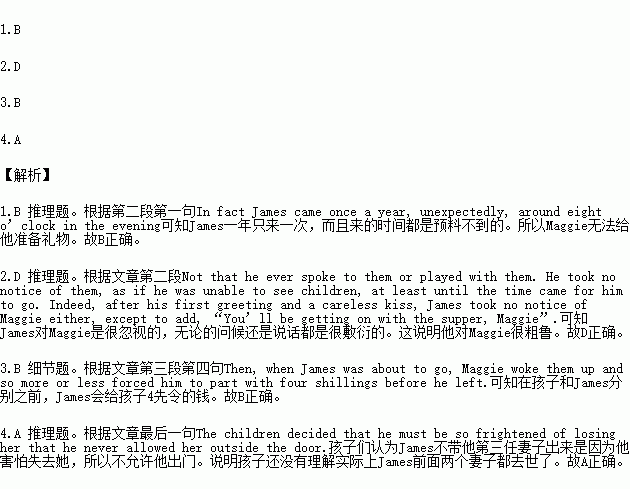题目内容
Maggie was very glad that James was not a frequent visitor to the house. In the children’s opinion, they had something that they couldn’t explain or understand about him and that excited their imagination. He stirred(激起) Maggie’s anger, however, so that she often said to her husband. “It’s mercy that brother of yours doesn’t come oftener.”
In fact James came once a year, unexpectedly, around eight o’clock in the evening, and he stayed for six hours of close discussion with his brother. His arrival was a signal to the children that their bedtime would be delayed. Not that he ever spoke to them or played with them. He took no notice of them, as if he was unable to see children, at least until the time came for him to go. Indeed, after his first greeting and a careless kiss, James took no notice of Maggie either, except to add, “You’ll be getting on with the supper, Maggie”. Such was his regard for her.
Maggie paid him back in her own way. She kept the children up, the four of them, to keep her company, she said, but of course they sang and made a noise and broke the endless sound of James’ voice. Very late, they dropped off to sleep in their chairs. Then, when James was about to go, Maggie woke them up and so more or less forced him to part with four shillings before he left. That gave her some satisfaction, for James, though rich, was unwilling to give or share what he had. He always went home by the last train, just after two o’clock.
Maggie’s children secretly stared at their uncle. They could not forget that he had in their mother’s words, “lost two wives and taken a third”. They wondered about those two unfortunate, lost ladies. They asked each other what their fate(命运) had been, and if neither could ever be found again. James never brought his third wife with him nor ever mentioned her. The children decided that he must be so frightened of losing her that he never allowed her outside the door.
1.Maggie never prepared anything special for James because ________.
A. he was a man difficult to please
B. she never knew when he was coming
C. she was too busy looking after her children
D. he never stayed long enough for a meal
2.What do we know about Jame’s behavior?
A. He was a kind man, with love for the family.
B. He was unselfish, especially towards his brother.
C. He was anxious to please the family, especially the children.
D. He was rude to his sister-in-law.
3.Maggie felt pleased when ________.
A. she paid James the money that she owed him
B. James gave some money to the children
C. she had to wake James up to catch his train
D. James thanked her for the nice supper
4.The children did not realize that two of James’ wives ________.
A. were dead
B. suffered from loss of memory
C. had run away from him
D. might reappear one day
 阅读快车系列答案
阅读快车系列答案假定你是李华,最近参加了由某电视台举办的中学生英语演讲比赛并获奖,该台准备组织获奖者去北京参加一次英语暑期夏令营活动,现就有关事项征求你的意见。请根据下表所提供的信息用英语以书信形式给予答复。请在答题卡上作答。
活动时间 | 7月16日~22日或8月18日~24日 |
活动内容 | 参加英语角 学唱英语歌曲 听英语讲座 表演英语短剧 看英语电影 教外宾学中文 |
对活动内容的 建议或要求 |
注意事项:
1. 选择适合你的时间,并说明理由;
2. 选择两项你喜欢的活动,并说明理由;
3. 对活动内容提出至少一个建议或要求;
4. 词数:100左右;
5. 信的开头和结尾已给出。
Dear Sir or Madame,
I’m very glad to be invited to the English summer camp.
_________________________________________________________________________________
_________________________________________________________________________________
_________________________________________________________________________________
_________________________________________________________________________________
_________________________________________________________________________________
_________________________________________________________________________________
Thank you very much,
Yours truly,
Li Hua

